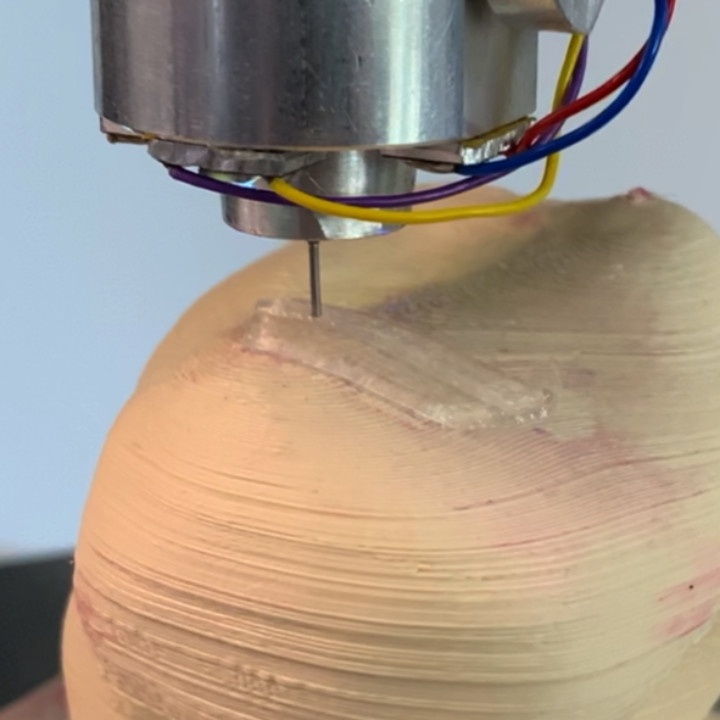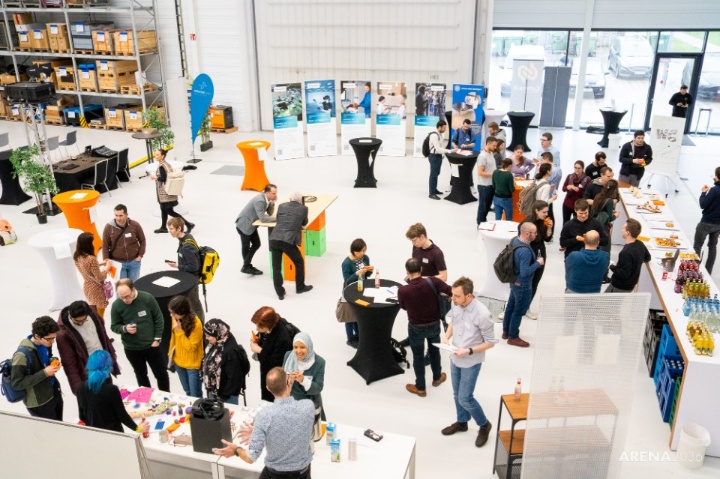Research association
SPI-MP: pioneer in personalised medical technology
Every person is unique – including, of course, when they are ill. This is why for quite some time now many different approaches to personalised medicine have been under development. The Stuttgart Partnership Initiative - Mass Personalization (SPI-MP), which focuses on basic research into fabrication and biomaterial technologies for personalised biomedical systems, is at the heart of such research work. The projects are diverse and range from artificial knee joint cartilage to state-of-the-art stroke diagnostics.
In October 2017, the University of Stuttgart, the four Stuttgart-based Fraunhofer Institutes – IAO, IBP, IPA and IGB – and industrial companies from the region launched a joint initiative: the High-Performance Center Mass Personalization (LZMP). The LZMP set itself the task of bringing together cross-sector research and practical expertise on ‘mass personalisation’. It focusses on the specific development of individualised products and services as well as the potential for small-batch industrial production that costs the same as mass-produced products.
The environmental impact of any such products is also of major importance as is their sustainability over an entire life cycle. The LZMP cooperation partners’ work is based on four thematic lines: 1) building and living spaces, 2) health, 3) mobility and living spaces, 4) products and production systems.
Interdisciplinary research for personalised biomedicine
 The High-Performance Center Mass Personalization (LZMP) works on a wide range of mass personalisation projects. It also encompasses the Stuttgart Partnership Initiative - Mass Personalization (SPI-MP), which primarily drives forward personalised medical technology applications. © LZMP
The High-Performance Center Mass Personalization (LZMP) works on a wide range of mass personalisation projects. It also encompasses the Stuttgart Partnership Initiative - Mass Personalization (SPI-MP), which primarily drives forward personalised medical technology applications. © LZMPThe University of Stuttgart is represented in the High Performance Center by the Stuttgart Partnership Initiative - Mass Personalization (SPI-MP). "The Stuttgart Partnership Initiative is a university research network that aims to increase cooperation with the Fraunhofer Institutes," says Dr. Janina Ulmer, Managing Director of the SPI-MP, also highlighting that the partners are no longer funded together, as they were at the beginning of their work.
The SPI-MP is financially supported by the Baden-Württemberg Ministry of Science, Research and the Arts and contributes to the ‘health’ thematic line: participating institutes specialise primarily in personalised medical technology applications, and the projects they are working on are described as ‘excellent basic research into fabrication and biomaterial technologies for personalised biomedical systems’. The SPI-MP is currently working on four projects that involve university researchers and partners from at least one Fraunhofer Institute. Six other research projects have already been completed: "This doesn’t mean we are no longer working on them," says Ulmer. "They are being continued with other funding, and we will of course continue to work with the LZMP in the future. Our communications efforts were so successful this year that, together with the Fraunhofer IPA, we were able to secure three new joint projects for the university."
In development: a personalised catheter, cartilage replacement and an ultrasound sensor
One of the current projects focuses on ‘Patient-specific modelling in endovascular stroke treatment - PatModES’. Catheters have to be navigated very quickly and reliably from the groin to the brain after a stroke or heart attack and there is currently no standard therapy for this, as very different instruments and manoeuvres are required due to highly patient-specific vascular geometry. If the contact forces generated during the procedure are too high, vessels can be damaged and instruments can get stuck. The project aims to develop a method for evaluating deformations and analysing vessel geometries using X-ray images prior to the procedure in order to avoid excessive contact forces that could lead to damage. The researchers can also draw on the results of the recently completed project ‘Endovascular contact force determination for patient-specific navigation - EndoPin’, in which a mechanical model has already been implemented and a transparent vessel model made of hydrogel has been developed to determine contact forces.
 The ‘Personalised cartilage implants for the knee joint’ project sets out to develop a way to print custom-fit cartilage implants made of biomaterial in three dimensions based on the individual patient's MR image. © ISW, University of Stuttgart
The ‘Personalised cartilage implants for the knee joint’ project sets out to develop a way to print custom-fit cartilage implants made of biomaterial in three dimensions based on the individual patient's MR image. © ISW, University of StuttgartAnother project - ‘Mapped sonography for paediatric anatomical imaging’ - will soon be launched in the Stuttgart research network. Working with the Department of Paediatric Surgery at the University Medical Centre Mannheim, the aim is to develop a radiation-free and cost-effective ultrasound imaging method for safe surgical planning in children. This is because CT and MRI scans cannot be used in children due to high radiation exposure and the need for sedation. Conventional ultrasound examinations, however, only provide a poor spatial mapping of the body. The goal is to develop a device that uses an ultrasound sensor to record several parameters simultaneously and create a three-dimensional map of the patient's body.
In another project - ‘Personalised cartilage implants for the knee joint’ - researchers are developing a personalised cartilage replacement made from biomaterial, which is produced using 3D printing based on MR images of the patient. This increases the chance of rapid adhesion in the knee so that patients can put weight on their joint and are pain-free more quickly. Initial results have already been obtained: a replacement tissue that is very close to nature, but at the same time easy to print. Work is currently underway to further optimise the material. Although the project has been completed within the LZMP, the cartilage project is now part of the large-scale EU project TRiAnkle, in which twelve partners from research, industry and clinics are developing personalised and 3D-printable implants for joints, ligaments and tendons.
Promoting cooperation on several levels
 The SPI-MP is regularly involved in a wide variety of events. One such event was Science Speed Dating in March 2024, where researchers got to know each other in ten-minute dating sessions. © LZMP
The SPI-MP is regularly involved in a wide variety of events. One such event was Science Speed Dating in March 2024, where researchers got to know each other in ten-minute dating sessions. © LZMPHowever, the Stuttgart-based initiative doesn’t just address specific research issues. "The SPI-MP’s core topic is medical technology on multiple levels. We are also very active in the start-up scene and work closely with a newly founded transfer centre," says Ulmer. "We are also regularly involved in networking events to further advance our areas of interest. At the new EXIST Woman funding event – a funding programme for women interested in starting a business: EmpowHER - Woman Entrepreneurs – we introduced our ten scholarship students to experienced company founders and representatives from government at the first event of its kind in Germany. The event also brought together a new aircraft construction start-up with a new co-founder, who will now also be funded for a period of 1.5 years through the EXIST programme."
The SPI-MP participated in several such events over the last few years. In early 2024, for example, it took part in the University of Stuttgart’s meccanica feminale, a week of further education aimed at promoting female scientists from various disciplines. The SPI-MP also attended the Science Speed Dating event, where over 50 researchers came together for a rather unusual networking session. "Through our research and networking activities, we have achieved the goals we originally set ourselves," says the managing director. "This confirms that the initiative works, and therefore collaboration within the performance centre, which has been increasing steadily in recent years, will continue into the future."